Leadership in Hospitality: Styles, Traits, Management Process and CSR
VerifiedAdded on 2020/12/09
|10
|3208
|68
Report
AI Summary
This report delves into the multifaceted realm of leadership within the hospitality industry, examining various leadership styles such as autocratic, democratic, laissez-faire, transformational, and bureaucratic approaches. It further explores the crucial leadership traits, including awareness, confidence, inspiration, empathy, honesty, focus, and decision-making, and their impact on leadership effectiveness. The report then analyzes the management process, encompassing planning, organizing, coordinating, staffing, leading/directing, controlling, and evaluating, highlighting their significance in achieving organizational goals. Finally, it addresses the crucial connection between organizational responsibility, responsible leadership, and corporate leadership systems that support Corporate Social Responsibility (CSR), emphasizing their role in fostering sustainable success within the hospitality sector. The report provides examples from the Hilton company to illustrate these concepts.
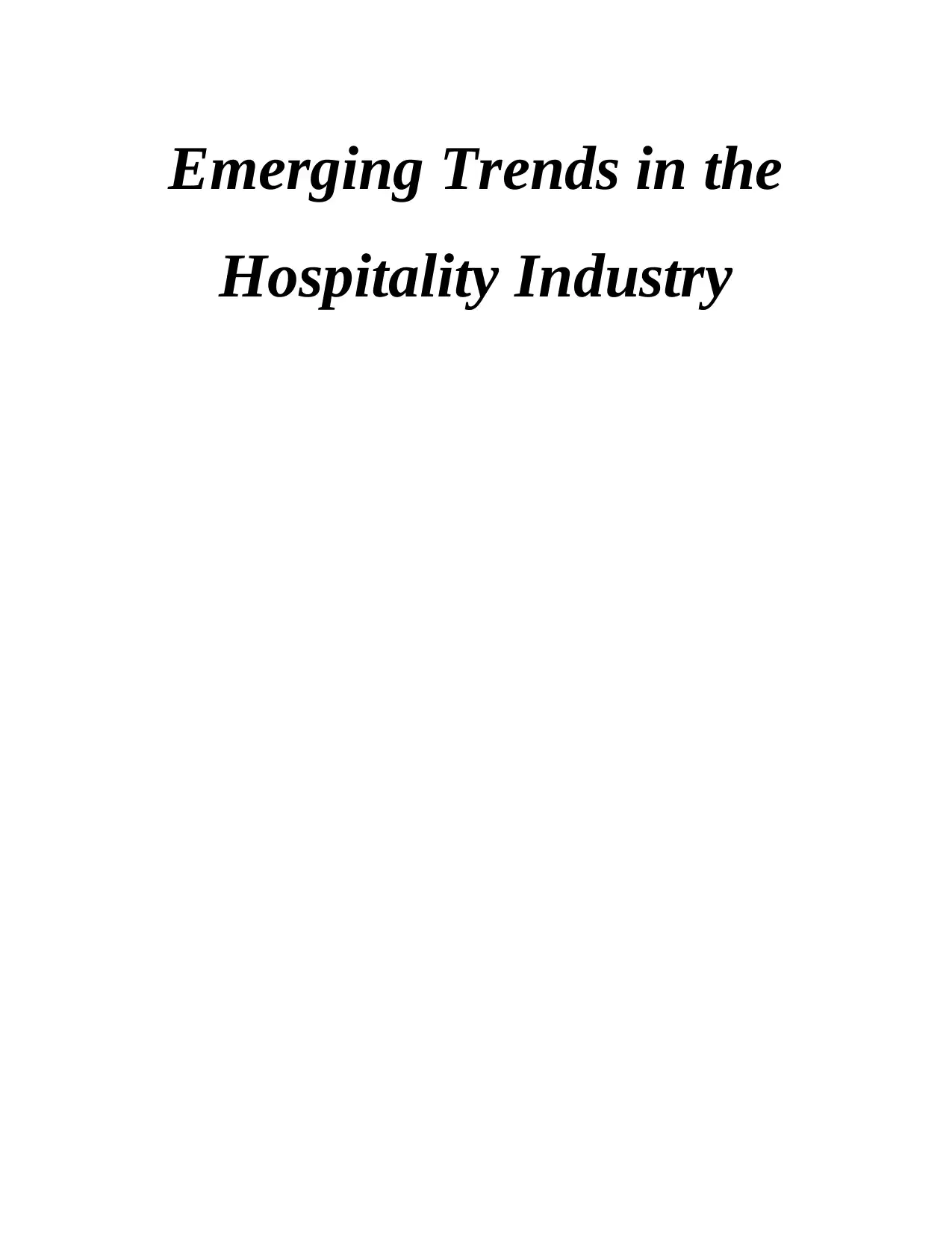
Emerging Trends in the
Hospitality Industry
Hospitality Industry
Paraphrase This Document
Need a fresh take? Get an instant paraphrase of this document with our AI Paraphraser
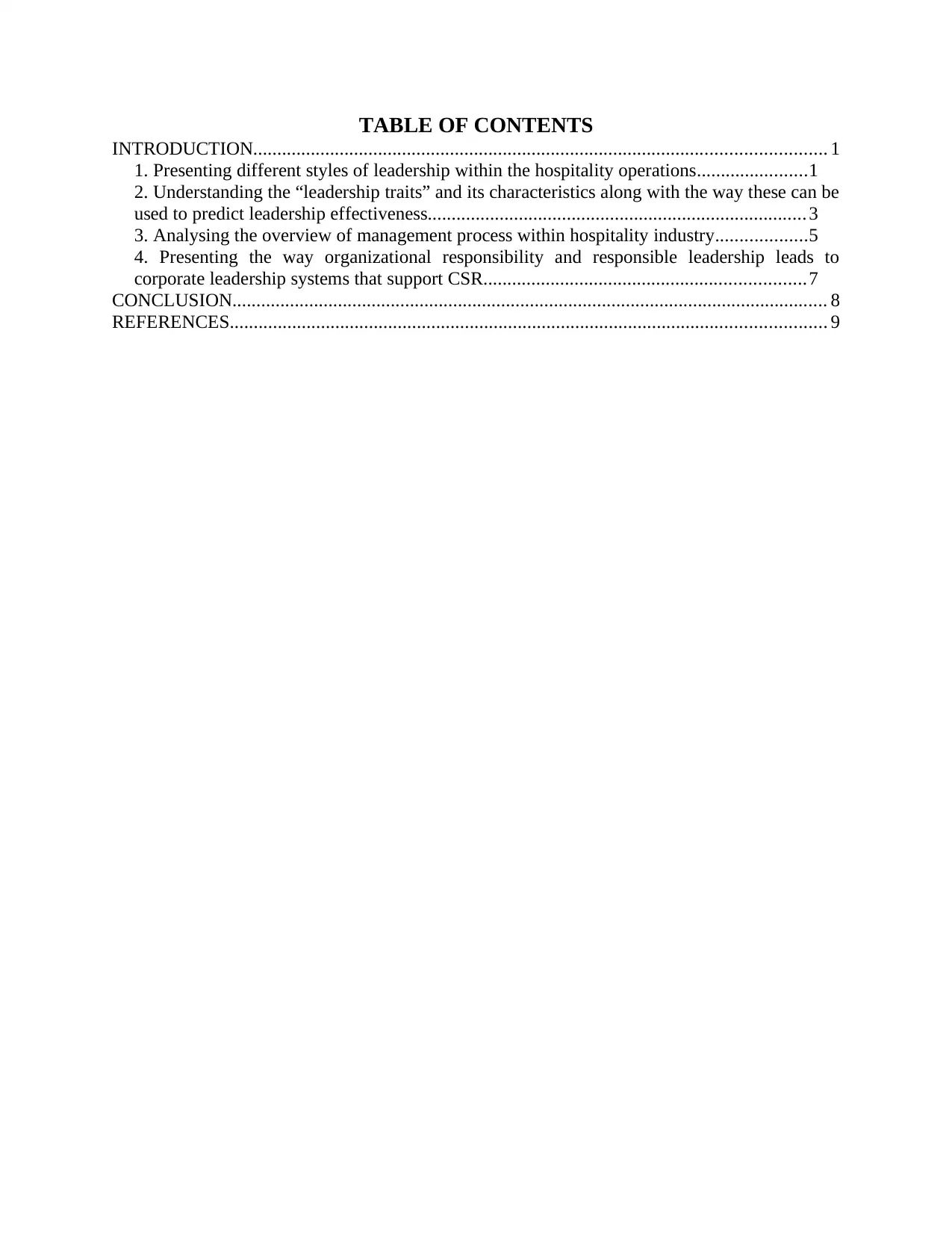
TABLE OF CONTENTS
INTRODUCTION....................................................................................................................... 1
1. Presenting different styles of leadership within the hospitality operations.......................1
2. Understanding the “leadership traits” and its characteristics along with the way these can be
used to predict leadership effectiveness............................................................................... 3
3. Analysing the overview of management process within hospitality industry...................5
4. Presenting the way organizational responsibility and responsible leadership leads to
corporate leadership systems that support CSR...................................................................7
CONCLUSION............................................................................................................................ 8
REFERENCES............................................................................................................................ 9
INTRODUCTION....................................................................................................................... 1
1. Presenting different styles of leadership within the hospitality operations.......................1
2. Understanding the “leadership traits” and its characteristics along with the way these can be
used to predict leadership effectiveness............................................................................... 3
3. Analysing the overview of management process within hospitality industry...................5
4. Presenting the way organizational responsibility and responsible leadership leads to
corporate leadership systems that support CSR...................................................................7
CONCLUSION............................................................................................................................ 8
REFERENCES............................................................................................................................ 9
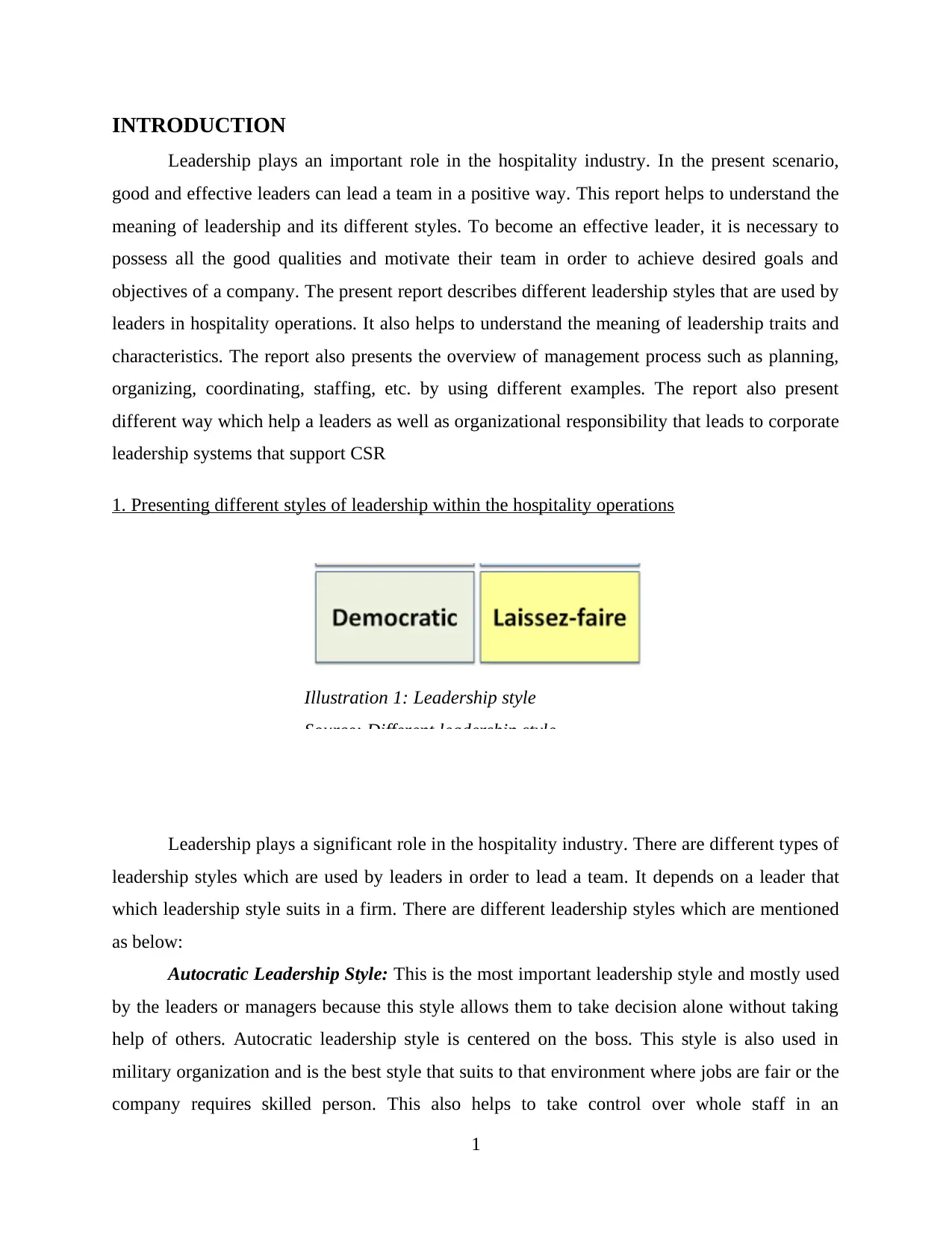
INTRODUCTION
Leadership plays an important role in the hospitality industry. In the present scenario,
good and effective leaders can lead a team in a positive way. This report helps to understand the
meaning of leadership and its different styles. To become an effective leader, it is necessary to
possess all the good qualities and motivate their team in order to achieve desired goals and
objectives of a company. The present report describes different leadership styles that are used by
leaders in hospitality operations. It also helps to understand the meaning of leadership traits and
characteristics. The report also presents the overview of management process such as planning,
organizing, coordinating, staffing, etc. by using different examples. The report also present
different way which help a leaders as well as organizational responsibility that leads to corporate
leadership systems that support CSR
1. Presenting different styles of leadership within the hospitality operations
Leadership plays a significant role in the hospitality industry. There are different types of
leadership styles which are used by leaders in order to lead a team. It depends on a leader that
which leadership style suits in a firm. There are different leadership styles which are mentioned
as below:
Autocratic Leadership Style: This is the most important leadership style and mostly used
by the leaders or managers because this style allows them to take decision alone without taking
help of others. Autocratic leadership style is centered on the boss. This style is also used in
military organization and is the best style that suits to that environment where jobs are fair or the
company requires skilled person. This also helps to take control over whole staff in an
1
Illustration 1: Leadership style
Source: Different leadership style
Leadership plays an important role in the hospitality industry. In the present scenario,
good and effective leaders can lead a team in a positive way. This report helps to understand the
meaning of leadership and its different styles. To become an effective leader, it is necessary to
possess all the good qualities and motivate their team in order to achieve desired goals and
objectives of a company. The present report describes different leadership styles that are used by
leaders in hospitality operations. It also helps to understand the meaning of leadership traits and
characteristics. The report also presents the overview of management process such as planning,
organizing, coordinating, staffing, etc. by using different examples. The report also present
different way which help a leaders as well as organizational responsibility that leads to corporate
leadership systems that support CSR
1. Presenting different styles of leadership within the hospitality operations
Leadership plays a significant role in the hospitality industry. There are different types of
leadership styles which are used by leaders in order to lead a team. It depends on a leader that
which leadership style suits in a firm. There are different leadership styles which are mentioned
as below:
Autocratic Leadership Style: This is the most important leadership style and mostly used
by the leaders or managers because this style allows them to take decision alone without taking
help of others. Autocratic leadership style is centered on the boss. This style is also used in
military organization and is the best style that suits to that environment where jobs are fair or the
company requires skilled person. This also helps to take control over whole staff in an
1
Illustration 1: Leadership style
Source: Different leadership style
⊘ This is a preview!⊘
Do you want full access?
Subscribe today to unlock all pages.

Trusted by 1+ million students worldwide
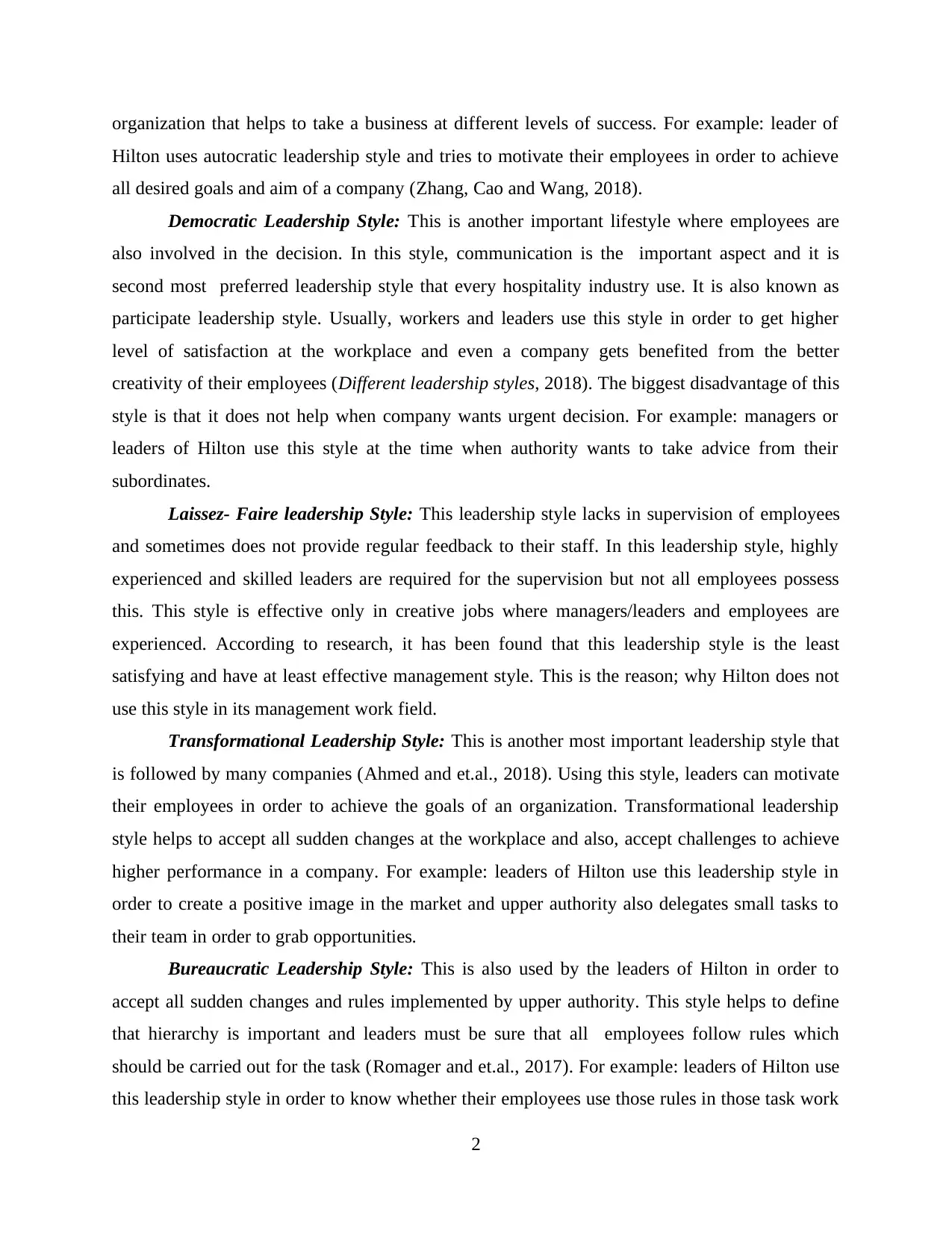
organization that helps to take a business at different levels of success. For example: leader of
Hilton uses autocratic leadership style and tries to motivate their employees in order to achieve
all desired goals and aim of a company (Zhang, Cao and Wang, 2018).
Democratic Leadership Style: This is another important lifestyle where employees are
also involved in the decision. In this style, communication is the important aspect and it is
second most preferred leadership style that every hospitality industry use. It is also known as
participate leadership style. Usually, workers and leaders use this style in order to get higher
level of satisfaction at the workplace and even a company gets benefited from the better
creativity of their employees (Different leadership styles, 2018). The biggest disadvantage of this
style is that it does not help when company wants urgent decision. For example: managers or
leaders of Hilton use this style at the time when authority wants to take advice from their
subordinates.
Laissez- Faire leadership Style: This leadership style lacks in supervision of employees
and sometimes does not provide regular feedback to their staff. In this leadership style, highly
experienced and skilled leaders are required for the supervision but not all employees possess
this. This style is effective only in creative jobs where managers/leaders and employees are
experienced. According to research, it has been found that this leadership style is the least
satisfying and have at least effective management style. This is the reason; why Hilton does not
use this style in its management work field.
Transformational Leadership Style: This is another most important leadership style that
is followed by many companies (Ahmed and et.al., 2018). Using this style, leaders can motivate
their employees in order to achieve the goals of an organization. Transformational leadership
style helps to accept all sudden changes at the workplace and also, accept challenges to achieve
higher performance in a company. For example: leaders of Hilton use this leadership style in
order to create a positive image in the market and upper authority also delegates small tasks to
their team in order to grab opportunities.
Bureaucratic Leadership Style: This is also used by the leaders of Hilton in order to
accept all sudden changes and rules implemented by upper authority. This style helps to define
that hierarchy is important and leaders must be sure that all employees follow rules which
should be carried out for the task (Romager and et.al., 2017). For example: leaders of Hilton use
this leadership style in order to know whether their employees use those rules in those task work
2
Hilton uses autocratic leadership style and tries to motivate their employees in order to achieve
all desired goals and aim of a company (Zhang, Cao and Wang, 2018).
Democratic Leadership Style: This is another important lifestyle where employees are
also involved in the decision. In this style, communication is the important aspect and it is
second most preferred leadership style that every hospitality industry use. It is also known as
participate leadership style. Usually, workers and leaders use this style in order to get higher
level of satisfaction at the workplace and even a company gets benefited from the better
creativity of their employees (Different leadership styles, 2018). The biggest disadvantage of this
style is that it does not help when company wants urgent decision. For example: managers or
leaders of Hilton use this style at the time when authority wants to take advice from their
subordinates.
Laissez- Faire leadership Style: This leadership style lacks in supervision of employees
and sometimes does not provide regular feedback to their staff. In this leadership style, highly
experienced and skilled leaders are required for the supervision but not all employees possess
this. This style is effective only in creative jobs where managers/leaders and employees are
experienced. According to research, it has been found that this leadership style is the least
satisfying and have at least effective management style. This is the reason; why Hilton does not
use this style in its management work field.
Transformational Leadership Style: This is another most important leadership style that
is followed by many companies (Ahmed and et.al., 2018). Using this style, leaders can motivate
their employees in order to achieve the goals of an organization. Transformational leadership
style helps to accept all sudden changes at the workplace and also, accept challenges to achieve
higher performance in a company. For example: leaders of Hilton use this leadership style in
order to create a positive image in the market and upper authority also delegates small tasks to
their team in order to grab opportunities.
Bureaucratic Leadership Style: This is also used by the leaders of Hilton in order to
accept all sudden changes and rules implemented by upper authority. This style helps to define
that hierarchy is important and leaders must be sure that all employees follow rules which
should be carried out for the task (Romager and et.al., 2017). For example: leaders of Hilton use
this leadership style in order to know whether their employees use those rules in those task work
2
Paraphrase This Document
Need a fresh take? Get an instant paraphrase of this document with our AI Paraphraser
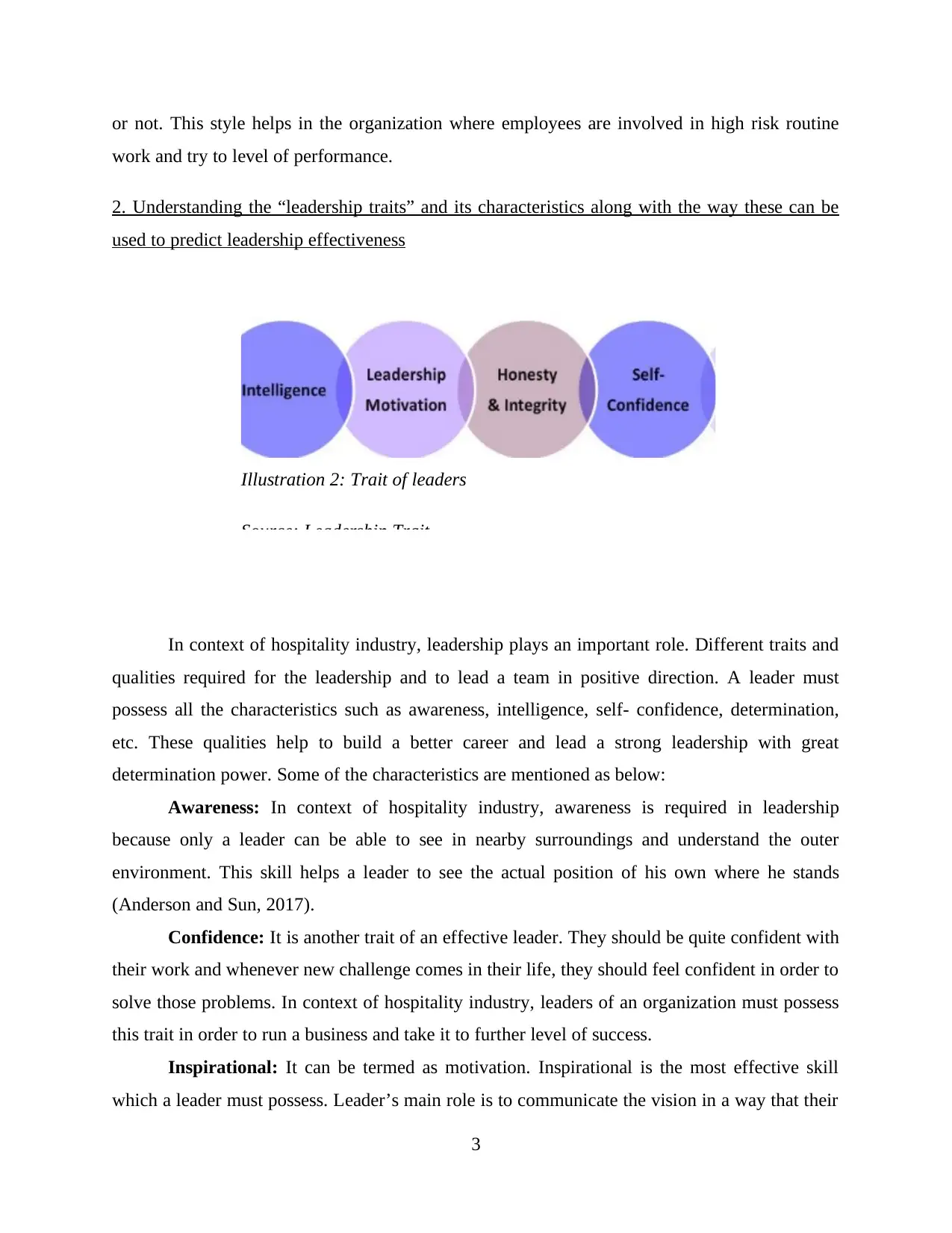
or not. This style helps in the organization where employees are involved in high risk routine
work and try to level of performance.
2. Understanding the “leadership traits” and its characteristics along with the way these can be
used to predict leadership effectiveness
In context of hospitality industry, leadership plays an important role. Different traits and
qualities required for the leadership and to lead a team in positive direction. A leader must
possess all the characteristics such as awareness, intelligence, self- confidence, determination,
etc. These qualities help to build a better career and lead a strong leadership with great
determination power. Some of the characteristics are mentioned as below:
Awareness: In context of hospitality industry, awareness is required in leadership
because only a leader can be able to see in nearby surroundings and understand the outer
environment. This skill helps a leader to see the actual position of his own where he stands
(Anderson and Sun, 2017).
Confidence: It is another trait of an effective leader. They should be quite confident with
their work and whenever new challenge comes in their life, they should feel confident in order to
solve those problems. In context of hospitality industry, leaders of an organization must possess
this trait in order to run a business and take it to further level of success.
Inspirational: It can be termed as motivation. Inspirational is the most effective skill
which a leader must possess. Leader’s main role is to communicate the vision in a way that their
3
Illustration 2: Trait of leaders
Source: Leadership Trait
work and try to level of performance.
2. Understanding the “leadership traits” and its characteristics along with the way these can be
used to predict leadership effectiveness
In context of hospitality industry, leadership plays an important role. Different traits and
qualities required for the leadership and to lead a team in positive direction. A leader must
possess all the characteristics such as awareness, intelligence, self- confidence, determination,
etc. These qualities help to build a better career and lead a strong leadership with great
determination power. Some of the characteristics are mentioned as below:
Awareness: In context of hospitality industry, awareness is required in leadership
because only a leader can be able to see in nearby surroundings and understand the outer
environment. This skill helps a leader to see the actual position of his own where he stands
(Anderson and Sun, 2017).
Confidence: It is another trait of an effective leader. They should be quite confident with
their work and whenever new challenge comes in their life, they should feel confident in order to
solve those problems. In context of hospitality industry, leaders of an organization must possess
this trait in order to run a business and take it to further level of success.
Inspirational: It can be termed as motivation. Inspirational is the most effective skill
which a leader must possess. Leader’s main role is to communicate the vision in a way that their
3
Illustration 2: Trait of leaders
Source: Leadership Trait
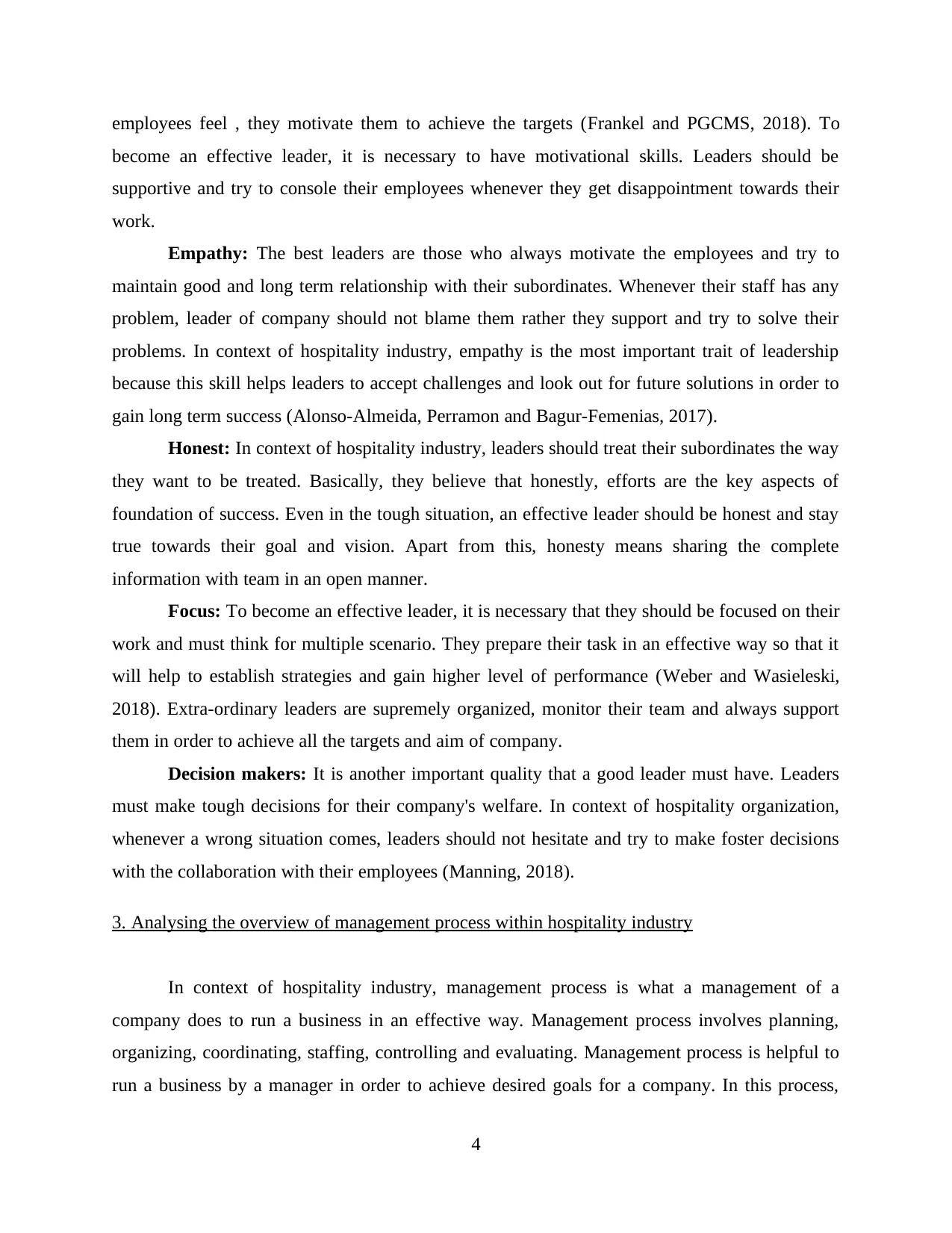
employees feel , they motivate them to achieve the targets (Frankel and PGCMS, 2018). To
become an effective leader, it is necessary to have motivational skills. Leaders should be
supportive and try to console their employees whenever they get disappointment towards their
work.
Empathy: The best leaders are those who always motivate the employees and try to
maintain good and long term relationship with their subordinates. Whenever their staff has any
problem, leader of company should not blame them rather they support and try to solve their
problems. In context of hospitality industry, empathy is the most important trait of leadership
because this skill helps leaders to accept challenges and look out for future solutions in order to
gain long term success (Alonso-Almeida, Perramon and Bagur-Femenias, 2017).
Honest: In context of hospitality industry, leaders should treat their subordinates the way
they want to be treated. Basically, they believe that honestly, efforts are the key aspects of
foundation of success. Even in the tough situation, an effective leader should be honest and stay
true towards their goal and vision. Apart from this, honesty means sharing the complete
information with team in an open manner.
Focus: To become an effective leader, it is necessary that they should be focused on their
work and must think for multiple scenario. They prepare their task in an effective way so that it
will help to establish strategies and gain higher level of performance (Weber and Wasieleski,
2018). Extra-ordinary leaders are supremely organized, monitor their team and always support
them in order to achieve all the targets and aim of company.
Decision makers: It is another important quality that a good leader must have. Leaders
must make tough decisions for their company's welfare. In context of hospitality organization,
whenever a wrong situation comes, leaders should not hesitate and try to make foster decisions
with the collaboration with their employees (Manning, 2018).
3. Analysing the overview of management process within hospitality industry
In context of hospitality industry, management process is what a management of a
company does to run a business in an effective way. Management process involves planning,
organizing, coordinating, staffing, controlling and evaluating. Management process is helpful to
run a business by a manager in order to achieve desired goals for a company. In this process,
4
become an effective leader, it is necessary to have motivational skills. Leaders should be
supportive and try to console their employees whenever they get disappointment towards their
work.
Empathy: The best leaders are those who always motivate the employees and try to
maintain good and long term relationship with their subordinates. Whenever their staff has any
problem, leader of company should not blame them rather they support and try to solve their
problems. In context of hospitality industry, empathy is the most important trait of leadership
because this skill helps leaders to accept challenges and look out for future solutions in order to
gain long term success (Alonso-Almeida, Perramon and Bagur-Femenias, 2017).
Honest: In context of hospitality industry, leaders should treat their subordinates the way
they want to be treated. Basically, they believe that honestly, efforts are the key aspects of
foundation of success. Even in the tough situation, an effective leader should be honest and stay
true towards their goal and vision. Apart from this, honesty means sharing the complete
information with team in an open manner.
Focus: To become an effective leader, it is necessary that they should be focused on their
work and must think for multiple scenario. They prepare their task in an effective way so that it
will help to establish strategies and gain higher level of performance (Weber and Wasieleski,
2018). Extra-ordinary leaders are supremely organized, monitor their team and always support
them in order to achieve all the targets and aim of company.
Decision makers: It is another important quality that a good leader must have. Leaders
must make tough decisions for their company's welfare. In context of hospitality organization,
whenever a wrong situation comes, leaders should not hesitate and try to make foster decisions
with the collaboration with their employees (Manning, 2018).
3. Analysing the overview of management process within hospitality industry
In context of hospitality industry, management process is what a management of a
company does to run a business in an effective way. Management process involves planning,
organizing, coordinating, staffing, controlling and evaluating. Management process is helpful to
run a business by a manager in order to achieve desired goals for a company. In this process,
4
⊘ This is a preview!⊘
Do you want full access?
Subscribe today to unlock all pages.

Trusted by 1+ million students worldwide
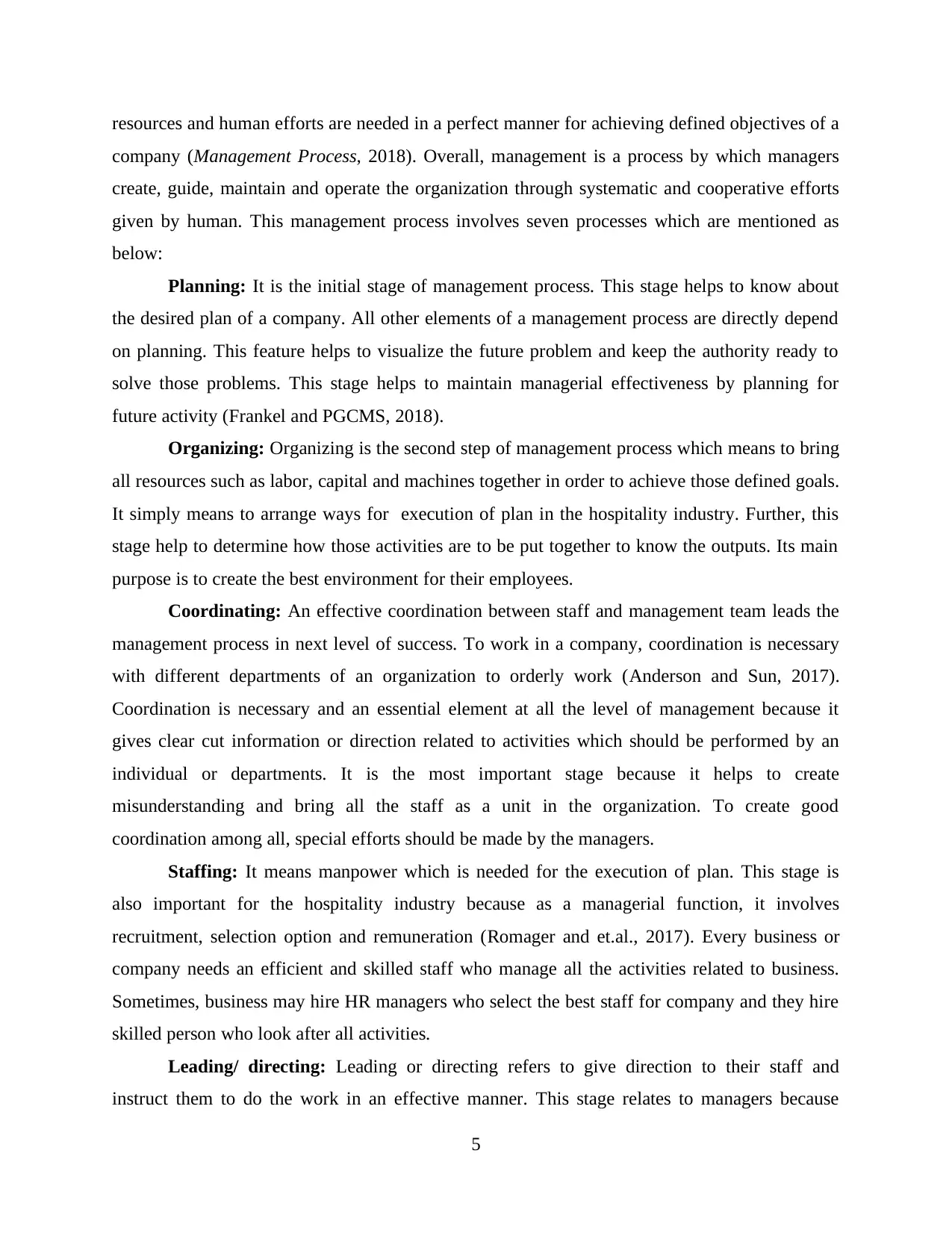
resources and human efforts are needed in a perfect manner for achieving defined objectives of a
company (Management Process, 2018). Overall, management is a process by which managers
create, guide, maintain and operate the organization through systematic and cooperative efforts
given by human. This management process involves seven processes which are mentioned as
below:
Planning: It is the initial stage of management process. This stage helps to know about
the desired plan of a company. All other elements of a management process are directly depend
on planning. This feature helps to visualize the future problem and keep the authority ready to
solve those problems. This stage helps to maintain managerial effectiveness by planning for
future activity (Frankel and PGCMS, 2018).
Organizing: Organizing is the second step of management process which means to bring
all resources such as labor, capital and machines together in order to achieve those defined goals.
It simply means to arrange ways for execution of plan in the hospitality industry. Further, this
stage help to determine how those activities are to be put together to know the outputs. Its main
purpose is to create the best environment for their employees.
Coordinating: An effective coordination between staff and management team leads the
management process in next level of success. To work in a company, coordination is necessary
with different departments of an organization to orderly work (Anderson and Sun, 2017).
Coordination is necessary and an essential element at all the level of management because it
gives clear cut information or direction related to activities which should be performed by an
individual or departments. It is the most important stage because it helps to create
misunderstanding and bring all the staff as a unit in the organization. To create good
coordination among all, special efforts should be made by the managers.
Staffing: It means manpower which is needed for the execution of plan. This stage is
also important for the hospitality industry because as a managerial function, it involves
recruitment, selection option and remuneration (Romager and et.al., 2017). Every business or
company needs an efficient and skilled staff who manage all the activities related to business.
Sometimes, business may hire HR managers who select the best staff for company and they hire
skilled person who look after all activities.
Leading/ directing: Leading or directing refers to give direction to their staff and
instruct them to do the work in an effective manner. This stage relates to managers because
5
company (Management Process, 2018). Overall, management is a process by which managers
create, guide, maintain and operate the organization through systematic and cooperative efforts
given by human. This management process involves seven processes which are mentioned as
below:
Planning: It is the initial stage of management process. This stage helps to know about
the desired plan of a company. All other elements of a management process are directly depend
on planning. This feature helps to visualize the future problem and keep the authority ready to
solve those problems. This stage helps to maintain managerial effectiveness by planning for
future activity (Frankel and PGCMS, 2018).
Organizing: Organizing is the second step of management process which means to bring
all resources such as labor, capital and machines together in order to achieve those defined goals.
It simply means to arrange ways for execution of plan in the hospitality industry. Further, this
stage help to determine how those activities are to be put together to know the outputs. Its main
purpose is to create the best environment for their employees.
Coordinating: An effective coordination between staff and management team leads the
management process in next level of success. To work in a company, coordination is necessary
with different departments of an organization to orderly work (Anderson and Sun, 2017).
Coordination is necessary and an essential element at all the level of management because it
gives clear cut information or direction related to activities which should be performed by an
individual or departments. It is the most important stage because it helps to create
misunderstanding and bring all the staff as a unit in the organization. To create good
coordination among all, special efforts should be made by the managers.
Staffing: It means manpower which is needed for the execution of plan. This stage is
also important for the hospitality industry because as a managerial function, it involves
recruitment, selection option and remuneration (Romager and et.al., 2017). Every business or
company needs an efficient and skilled staff who manage all the activities related to business.
Sometimes, business may hire HR managers who select the best staff for company and they hire
skilled person who look after all activities.
Leading/ directing: Leading or directing refers to give direction to their staff and
instruct them to do the work in an effective manner. This stage relates to managers because
5
Paraphrase This Document
Need a fresh take? Get an instant paraphrase of this document with our AI Paraphraser
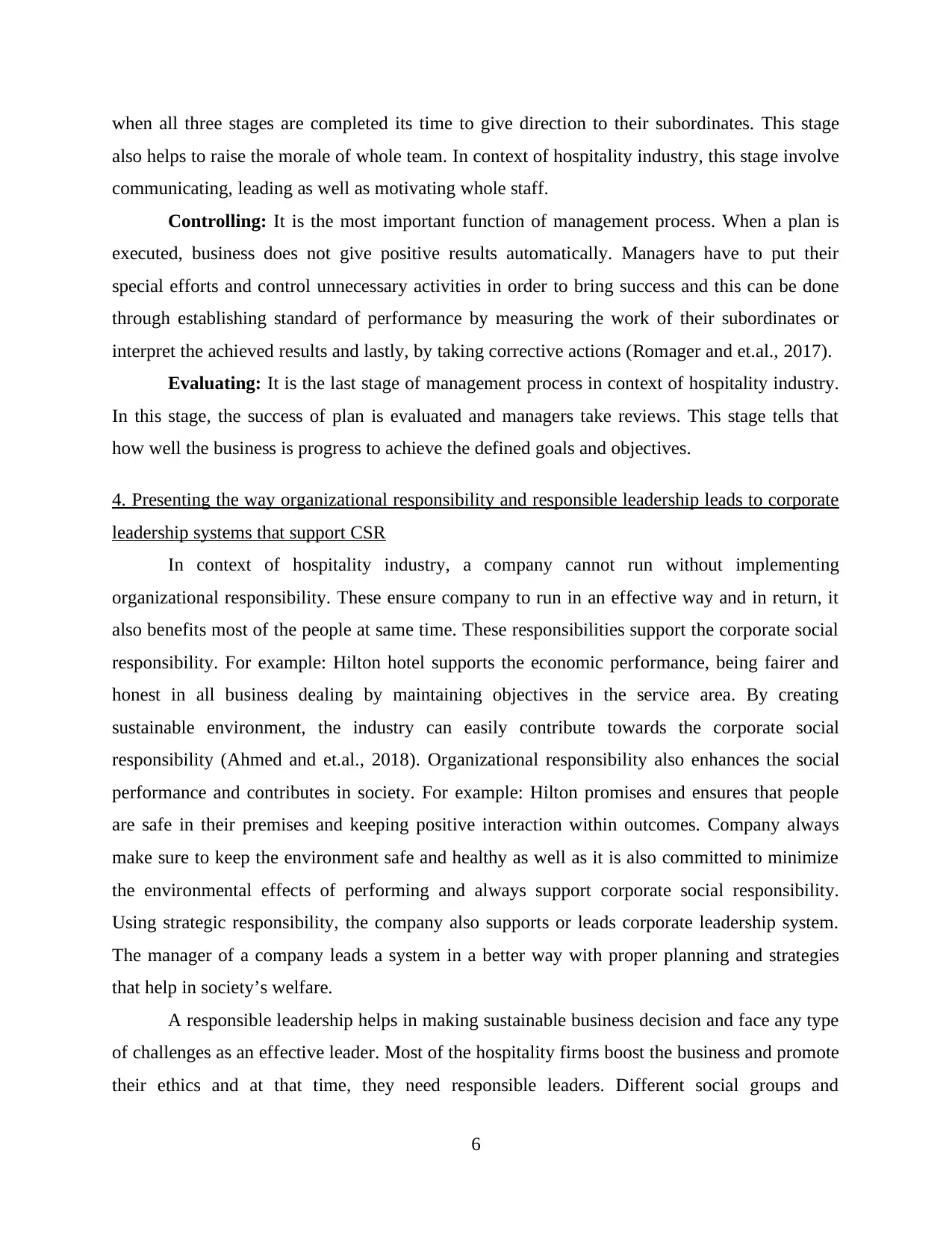
when all three stages are completed its time to give direction to their subordinates. This stage
also helps to raise the morale of whole team. In context of hospitality industry, this stage involve
communicating, leading as well as motivating whole staff.
Controlling: It is the most important function of management process. When a plan is
executed, business does not give positive results automatically. Managers have to put their
special efforts and control unnecessary activities in order to bring success and this can be done
through establishing standard of performance by measuring the work of their subordinates or
interpret the achieved results and lastly, by taking corrective actions (Romager and et.al., 2017).
Evaluating: It is the last stage of management process in context of hospitality industry.
In this stage, the success of plan is evaluated and managers take reviews. This stage tells that
how well the business is progress to achieve the defined goals and objectives.
4. Presenting the way organizational responsibility and responsible leadership leads to corporate
leadership systems that support CSR
In context of hospitality industry, a company cannot run without implementing
organizational responsibility. These ensure company to run in an effective way and in return, it
also benefits most of the people at same time. These responsibilities support the corporate social
responsibility. For example: Hilton hotel supports the economic performance, being fairer and
honest in all business dealing by maintaining objectives in the service area. By creating
sustainable environment, the industry can easily contribute towards the corporate social
responsibility (Ahmed and et.al., 2018). Organizational responsibility also enhances the social
performance and contributes in society. For example: Hilton promises and ensures that people
are safe in their premises and keeping positive interaction within outcomes. Company always
make sure to keep the environment safe and healthy as well as it is also committed to minimize
the environmental effects of performing and always support corporate social responsibility.
Using strategic responsibility, the company also supports or leads corporate leadership system.
The manager of a company leads a system in a better way with proper planning and strategies
that help in society’s welfare.
A responsible leadership helps in making sustainable business decision and face any type
of challenges as an effective leader. Most of the hospitality firms boost the business and promote
their ethics and at that time, they need responsible leaders. Different social groups and
6
also helps to raise the morale of whole team. In context of hospitality industry, this stage involve
communicating, leading as well as motivating whole staff.
Controlling: It is the most important function of management process. When a plan is
executed, business does not give positive results automatically. Managers have to put their
special efforts and control unnecessary activities in order to bring success and this can be done
through establishing standard of performance by measuring the work of their subordinates or
interpret the achieved results and lastly, by taking corrective actions (Romager and et.al., 2017).
Evaluating: It is the last stage of management process in context of hospitality industry.
In this stage, the success of plan is evaluated and managers take reviews. This stage tells that
how well the business is progress to achieve the defined goals and objectives.
4. Presenting the way organizational responsibility and responsible leadership leads to corporate
leadership systems that support CSR
In context of hospitality industry, a company cannot run without implementing
organizational responsibility. These ensure company to run in an effective way and in return, it
also benefits most of the people at same time. These responsibilities support the corporate social
responsibility. For example: Hilton hotel supports the economic performance, being fairer and
honest in all business dealing by maintaining objectives in the service area. By creating
sustainable environment, the industry can easily contribute towards the corporate social
responsibility (Ahmed and et.al., 2018). Organizational responsibility also enhances the social
performance and contributes in society. For example: Hilton promises and ensures that people
are safe in their premises and keeping positive interaction within outcomes. Company always
make sure to keep the environment safe and healthy as well as it is also committed to minimize
the environmental effects of performing and always support corporate social responsibility.
Using strategic responsibility, the company also supports or leads corporate leadership system.
The manager of a company leads a system in a better way with proper planning and strategies
that help in society’s welfare.
A responsible leadership helps in making sustainable business decision and face any type
of challenges as an effective leader. Most of the hospitality firms boost the business and promote
their ethics and at that time, they need responsible leaders. Different social groups and
6
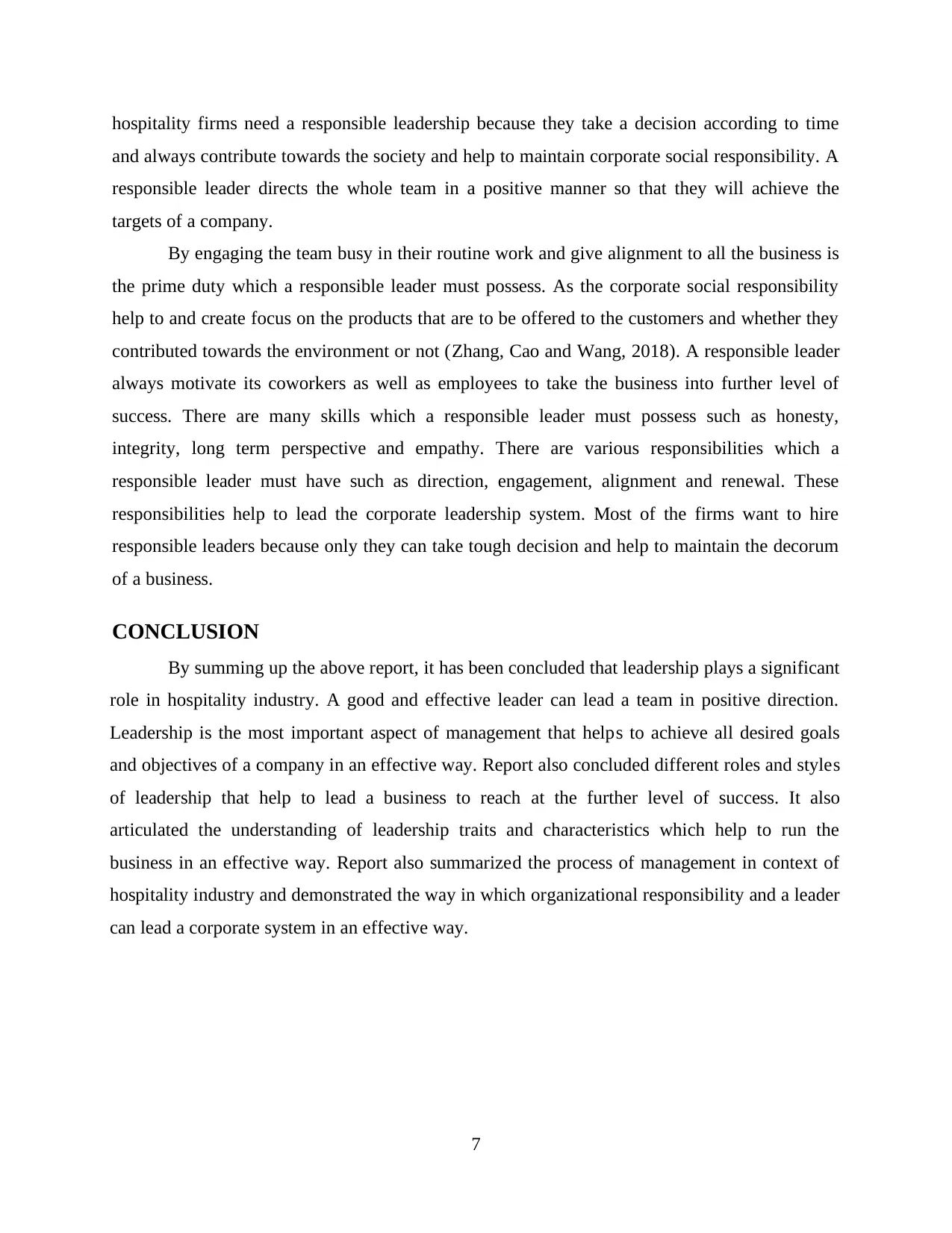
hospitality firms need a responsible leadership because they take a decision according to time
and always contribute towards the society and help to maintain corporate social responsibility. A
responsible leader directs the whole team in a positive manner so that they will achieve the
targets of a company.
By engaging the team busy in their routine work and give alignment to all the business is
the prime duty which a responsible leader must possess. As the corporate social responsibility
help to and create focus on the products that are to be offered to the customers and whether they
contributed towards the environment or not (Zhang, Cao and Wang, 2018). A responsible leader
always motivate its coworkers as well as employees to take the business into further level of
success. There are many skills which a responsible leader must possess such as honesty,
integrity, long term perspective and empathy. There are various responsibilities which a
responsible leader must have such as direction, engagement, alignment and renewal. These
responsibilities help to lead the corporate leadership system. Most of the firms want to hire
responsible leaders because only they can take tough decision and help to maintain the decorum
of a business.
CONCLUSION
By summing up the above report, it has been concluded that leadership plays a significant
role in hospitality industry. A good and effective leader can lead a team in positive direction.
Leadership is the most important aspect of management that helps to achieve all desired goals
and objectives of a company in an effective way. Report also concluded different roles and styles
of leadership that help to lead a business to reach at the further level of success. It also
articulated the understanding of leadership traits and characteristics which help to run the
business in an effective way. Report also summarized the process of management in context of
hospitality industry and demonstrated the way in which organizational responsibility and a leader
can lead a corporate system in an effective way.
7
and always contribute towards the society and help to maintain corporate social responsibility. A
responsible leader directs the whole team in a positive manner so that they will achieve the
targets of a company.
By engaging the team busy in their routine work and give alignment to all the business is
the prime duty which a responsible leader must possess. As the corporate social responsibility
help to and create focus on the products that are to be offered to the customers and whether they
contributed towards the environment or not (Zhang, Cao and Wang, 2018). A responsible leader
always motivate its coworkers as well as employees to take the business into further level of
success. There are many skills which a responsible leader must possess such as honesty,
integrity, long term perspective and empathy. There are various responsibilities which a
responsible leader must have such as direction, engagement, alignment and renewal. These
responsibilities help to lead the corporate leadership system. Most of the firms want to hire
responsible leaders because only they can take tough decision and help to maintain the decorum
of a business.
CONCLUSION
By summing up the above report, it has been concluded that leadership plays a significant
role in hospitality industry. A good and effective leader can lead a team in positive direction.
Leadership is the most important aspect of management that helps to achieve all desired goals
and objectives of a company in an effective way. Report also concluded different roles and styles
of leadership that help to lead a business to reach at the further level of success. It also
articulated the understanding of leadership traits and characteristics which help to run the
business in an effective way. Report also summarized the process of management in context of
hospitality industry and demonstrated the way in which organizational responsibility and a leader
can lead a corporate system in an effective way.
7
⊘ This is a preview!⊘
Do you want full access?
Subscribe today to unlock all pages.

Trusted by 1+ million students worldwide
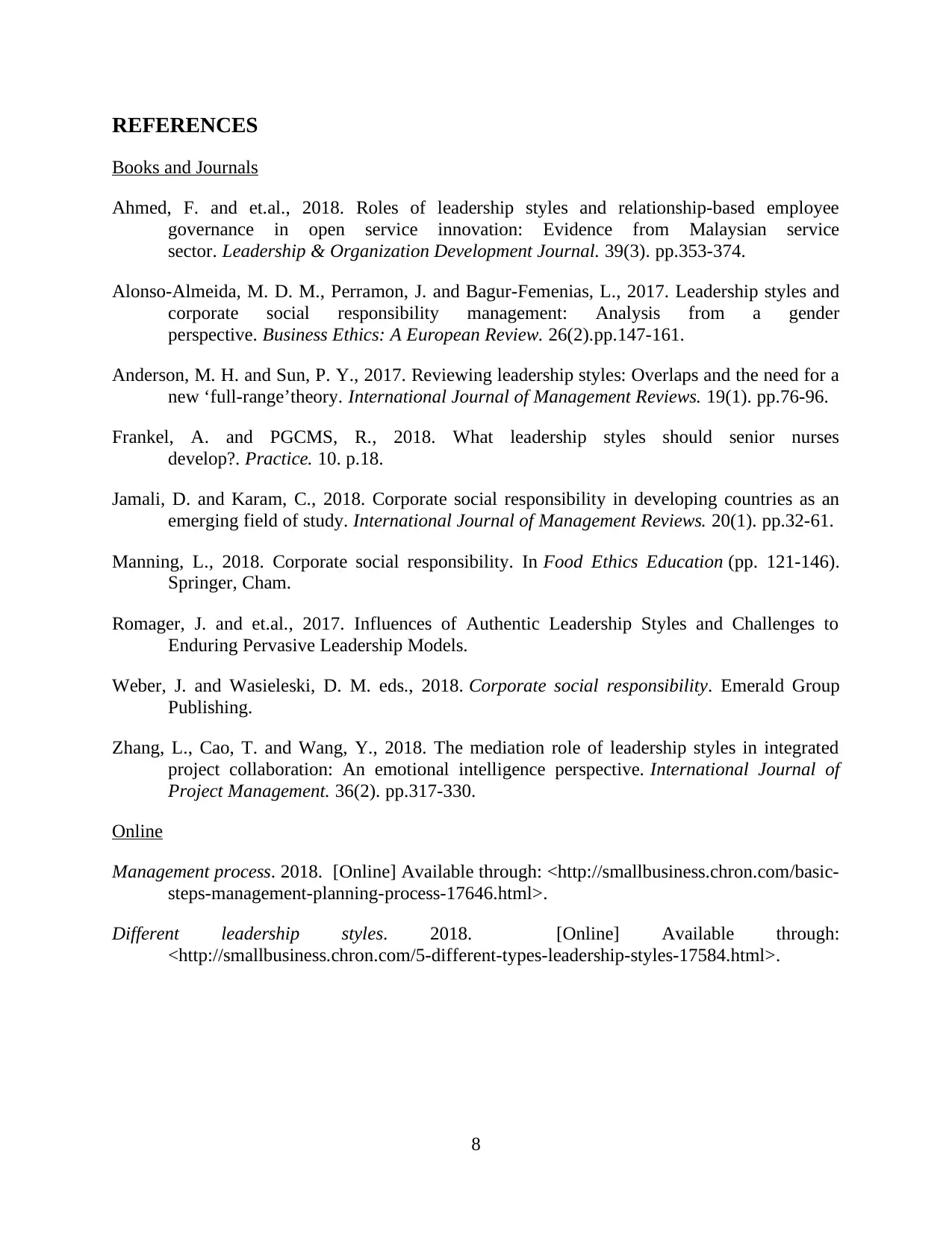
REFERENCES
Books and Journals
Ahmed, F. and et.al., 2018. Roles of leadership styles and relationship-based employee
governance in open service innovation: Evidence from Malaysian service
sector. Leadership & Organization Development Journal. 39(3). pp.353-374.
Alonso-Almeida, M. D. M., Perramon, J. and Bagur-Femenias, L., 2017. Leadership styles and
corporate social responsibility management: Analysis from a gender
perspective. Business Ethics: A European Review. 26(2).pp.147-161.
Anderson, M. H. and Sun, P. Y., 2017. Reviewing leadership styles: Overlaps and the need for a
new ‘full-range’theory. International Journal of Management Reviews. 19(1). pp.76-96.
Frankel, A. and PGCMS, R., 2018. What leadership styles should senior nurses
develop?. Practice. 10. p.18.
Jamali, D. and Karam, C., 2018. Corporate social responsibility in developing countries as an
emerging field of study. International Journal of Management Reviews. 20(1). pp.32-61.
Manning, L., 2018. Corporate social responsibility. In Food Ethics Education (pp. 121-146).
Springer, Cham.
Romager, J. and et.al., 2017. Influences of Authentic Leadership Styles and Challenges to
Enduring Pervasive Leadership Models.
Weber, J. and Wasieleski, D. M. eds., 2018. Corporate social responsibility. Emerald Group
Publishing.
Zhang, L., Cao, T. and Wang, Y., 2018. The mediation role of leadership styles in integrated
project collaboration: An emotional intelligence perspective. International Journal of
Project Management. 36(2). pp.317-330.
Online
Management process. 2018. [Online] Available through: <http://smallbusiness.chron.com/basic-
steps-management-planning-process-17646.html>.
Different leadership styles. 2018. [Online] Available through:
<http://smallbusiness.chron.com/5-different-types-leadership-styles-17584.html>.
8
Books and Journals
Ahmed, F. and et.al., 2018. Roles of leadership styles and relationship-based employee
governance in open service innovation: Evidence from Malaysian service
sector. Leadership & Organization Development Journal. 39(3). pp.353-374.
Alonso-Almeida, M. D. M., Perramon, J. and Bagur-Femenias, L., 2017. Leadership styles and
corporate social responsibility management: Analysis from a gender
perspective. Business Ethics: A European Review. 26(2).pp.147-161.
Anderson, M. H. and Sun, P. Y., 2017. Reviewing leadership styles: Overlaps and the need for a
new ‘full-range’theory. International Journal of Management Reviews. 19(1). pp.76-96.
Frankel, A. and PGCMS, R., 2018. What leadership styles should senior nurses
develop?. Practice. 10. p.18.
Jamali, D. and Karam, C., 2018. Corporate social responsibility in developing countries as an
emerging field of study. International Journal of Management Reviews. 20(1). pp.32-61.
Manning, L., 2018. Corporate social responsibility. In Food Ethics Education (pp. 121-146).
Springer, Cham.
Romager, J. and et.al., 2017. Influences of Authentic Leadership Styles and Challenges to
Enduring Pervasive Leadership Models.
Weber, J. and Wasieleski, D. M. eds., 2018. Corporate social responsibility. Emerald Group
Publishing.
Zhang, L., Cao, T. and Wang, Y., 2018. The mediation role of leadership styles in integrated
project collaboration: An emotional intelligence perspective. International Journal of
Project Management. 36(2). pp.317-330.
Online
Management process. 2018. [Online] Available through: <http://smallbusiness.chron.com/basic-
steps-management-planning-process-17646.html>.
Different leadership styles. 2018. [Online] Available through:
<http://smallbusiness.chron.com/5-different-types-leadership-styles-17584.html>.
8
1 out of 10
Related Documents
Your All-in-One AI-Powered Toolkit for Academic Success.
+13062052269
info@desklib.com
Available 24*7 on WhatsApp / Email
![[object Object]](/_next/static/media/star-bottom.7253800d.svg)
Unlock your academic potential
Copyright © 2020–2026 A2Z Services. All Rights Reserved. Developed and managed by ZUCOL.





